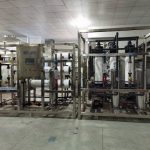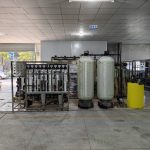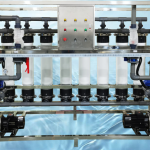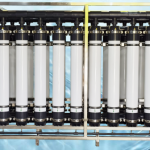
Water Treatment Industrial UF Plant
What is Ultrafiltration (UF)?
Ultrafiltration (UF) is membrane filtration process that suspended solids and solutes of high molecular weight are retained in the so-called retentate, while water and low molecular weight solutes pass through the membrane in the permeate (filtrate).
Ultrafiltration is not fundamentally different from microfiltration. Both of these separate based on size exclusion or particle capture.
Ultrafiltration applied in drinking water purification
Ultrafiltration can be used for the removal of particulates and macromolecules from raw water to produce potable water. It has been used to either replace existing secondary (coagulation, flocculation, sedimentation) and tertiary filtration (sand filtration and chlorination) systems employed in water treatment plants or as standalone systems in isolated regions with growing populations. When treating water with high suspended solids, UF is often integrated into the process, utilising primary (screening, flotation, filtration) and some secondary treatments as pre-treatment stages. UF processes are currently preferred over traditional treatment methods for the following reasons:
- No chemicals required (aside from cleaning)
- Constant product quality regardless of feed quality
- Compact plant size
- Capable of exceeding regulatory standards of water quality, achieving 90–100% pathogen removal
UF processes are currently limited by the high cost incurred due to membrane fouling and replacement. Additional pretreatment of feed water is required to prevent excessive damage to the membrane units.
In many cases UF is used for pre filtration in reverse osmosis (RO) plants to protect the RO membranes.




